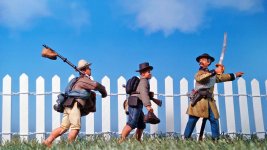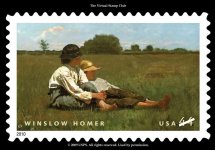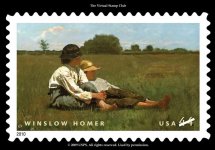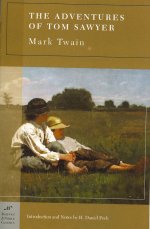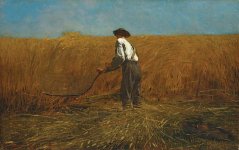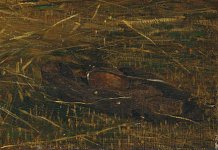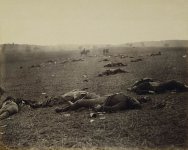Three of my favorite figures featured in a great looking photo. Very nice Randy.

Mike
The 2 young Rebs always make me think of Whittier's
"Barefoot Boy"
BLESSINGS on thee, little man,
Barefoot boy, with cheek of tan!
With thy turned-up pantaloons,
And thy merry whistled tunes;
With thy red lip, redder still 5
Kissed by strawberries on the hill;
With the sunshine on thy face,
Through thy torn brim’s jaunty grace;
From my heart I give thee joy,—
I was once a barefoot boy! 10
Prince thou art,—the grown-up man
Only is republican.
Let the million-dollared ride!
Barefoot, trudging at his side,
Thou hast more than he can buy 15
In the reach of ear and eye,—
Outward sunshine, inward joy:
Blessings on thee, barefoot boy!
Oh for boyhood’s painless play,
Sleep that wakes in laughing day, 20
Health that mocks the doctor’s rules,
Knowledge never learned of schools,
Of the wild bee’s morning chase,
Of the wild-flower’s time and place,
Flight of fowl and habitude 25
Of the tenants of the wood;
How the tortoise bears his shell,
How the woodchuck digs his cell,
And the ground-mole sinks his well;
How the robin feeds her young, 30
How the oriole’s nest is hung;
Where the whitest lilies blow,
Where the freshest berries grow,
Where the ground-nut trails its vine,
Where the wood-grape’s clusters shine; 35
Of the black wasp’s cunning way,
Mason of his walls of clay,
And the architectural plans
Of gray hornet artisans!
For, eschewing books and tasks, 40
Nature answers all he asks;
Hand in hand with her he walks,
Face to face with her he talks,
Part and parcel of her joy,—
Blessings on the barefoot boy! 45
Oh for boyhood’s time of June,
Crowding years in one brief moon,
When all things I heard or saw,
Me, their master, waited for.
I was rich in flowers and trees, 50
Humming-birds and honey-bees;
For my sport the squirrel played,
Plied the snouted mole his spade;
For my taste the blackberry cone
Purpled over hedge and stone; 55
Laughed the brook for my delight
Through the day and through the night,
Whispering at the garden wall,
Talked with me from fall to fall;
Mine the sand-rimmed pickerel pond, 60
Mine the walnut slopes beyond,
Mine, on bending orchard trees,
Apples of Hesperides!
Still as my horizon grew,
Larger grew my riches too; 65
All the world I saw or knew
Seemed a complex Chinese toy,
Fashioned for a barefoot boy!
Oh for festal dainties spread,
Like my bowl of milk and bread; 70
Pewter spoon and bowl of wood,
On the door-stone, gray and rude!
O’er me, like a regal tent,
Cloudy-ribbed, the sunset bent,
Purple-curtained, fringed with gold, 75
Looped in many a wind-swung fold;
While for music came the play
Of the pied frogs’ orchestra;
And, to light the noisy choir,
Lit the fly his lamp of fire. 80
I was monarch: pomp and joy
Waited on the barefoot boy!
Cheerily, then, my little man,
Live and laugh, as boyhood can!
Though the flinty slopes be hard, 85
Stubble-speared the new-mown sward,
Every morn shall lead thee through
Fresh baptisms of the dew;
Every evening from thy feet
Shall the cool wind kiss the heat: 90
All too soon these feet must hide
In the prison cells of pride,
Lose the freedom of the sod,
Like a colt’s for work be shod,
Made to treat the mills of toil, 95
Up and down in ceaseless moil:
Happy if their track be found
Never on forbidden ground;
Happy if they sink not in
Quick and treacherous sands of sin. 100
Ah! that thou couldst know thy joy,
Ere it passes, barefoot boy!
and Winslow Homer

